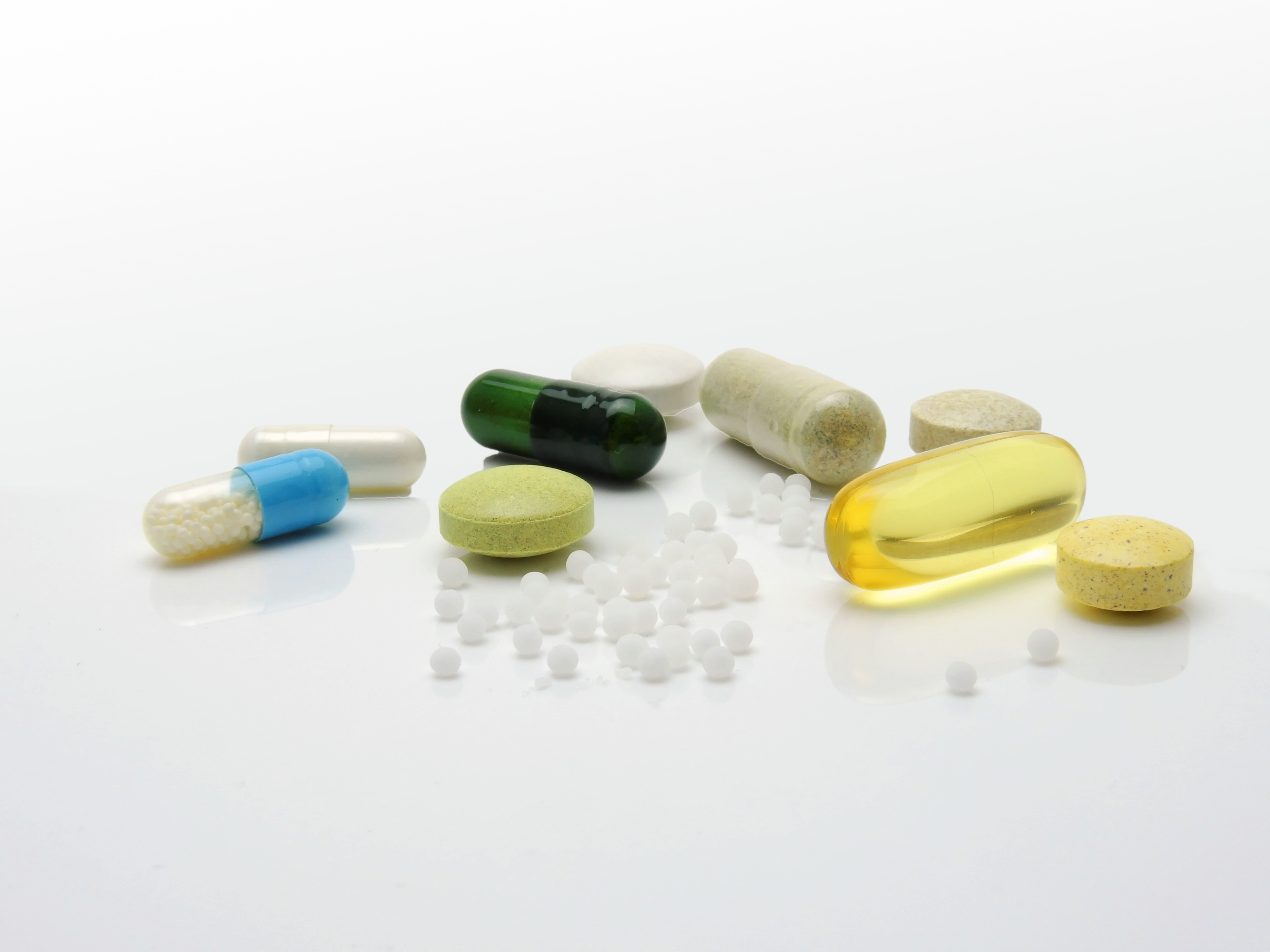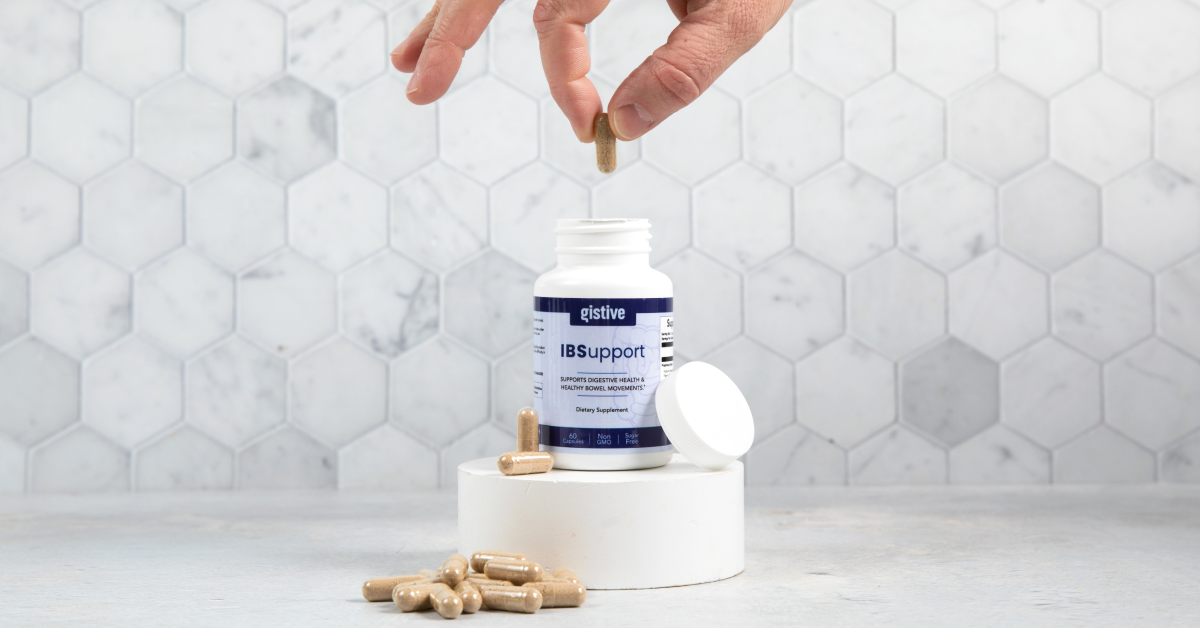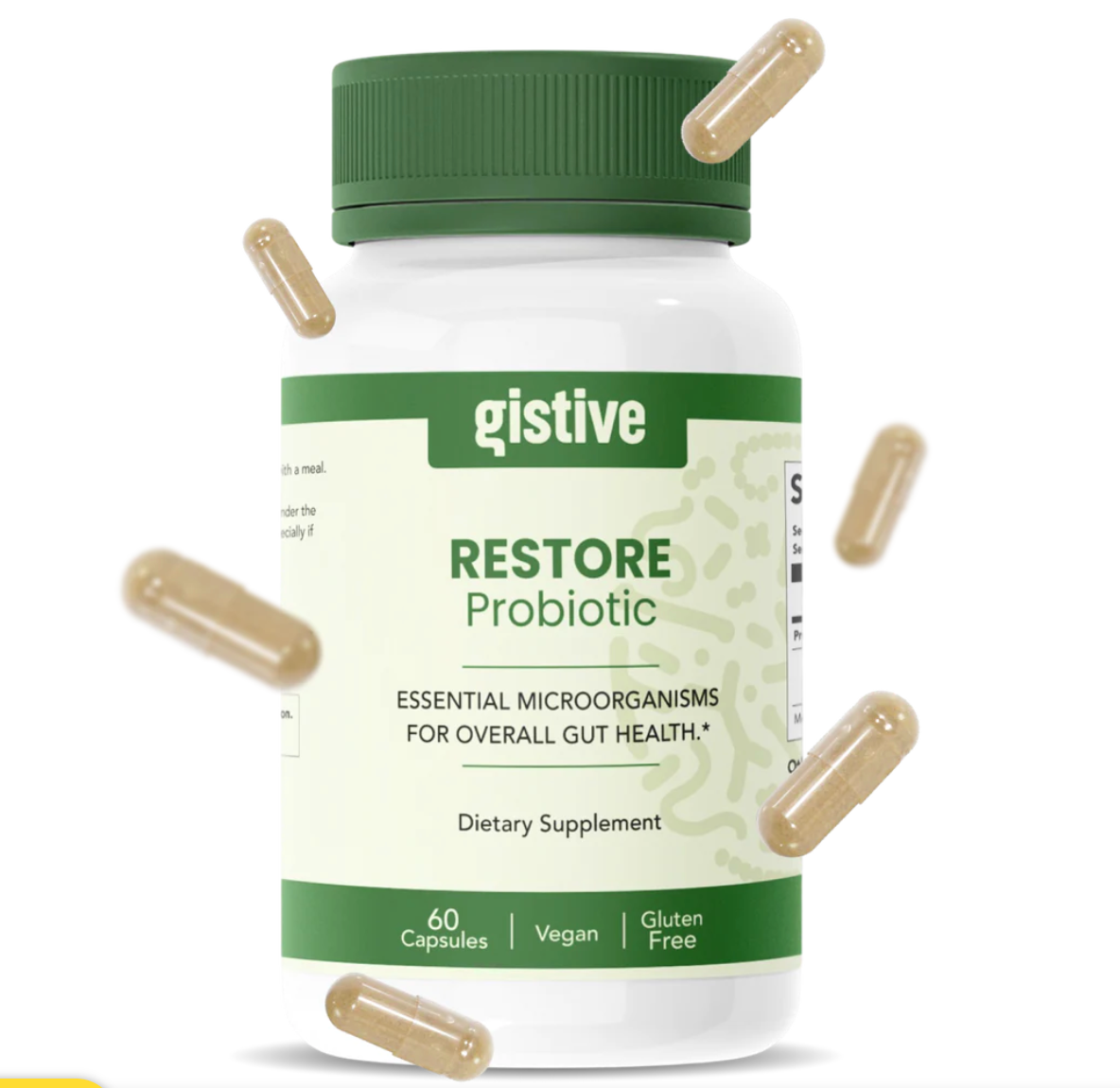Navigating the waters of your health, if you’ve decided to do so in the first place, can be a confusing voyage, especially if you don’t know what you’re fighting and what to look out for.
Getting struck with disease and painful waves from every direction can put you in a bad position and render you helpless when caring for yourself.
All of the above is especially true when you have poor gut health, and that’s because the gut is a sensitive organ that is responsible for a lot of different things, from your mental health to your bowel movements.
There have been many trends in the gut health niche over the years, and good bacteria slash probiotics are the current rage in the cage, and we're all for it.
But that begs the question: What are the signs that you need probiotics? How do you know if your body is probiotic-deficient or if it’s something else that will help fix up all your pain?
That's exactly what Gistive is here to answer, but before we dive into the technicalities behind it, here are some tell-tale signs that your body gives when it needs probiotics:
-
Your Skin Is Breaking Out
-
Bloating and Constipation
-
Less Immunity
-
You’ve been taking antibiotics
-
Irregular Sleep Cycles
-
You Feel Fatigued Or Sluggish
-
Trouble Maintaining A Healthy Weight
-
Increased Food Allergies
We'll explain these points thoroughly, along with several other medical and educational aspects of probiotics that you need to understand before you start taking probiotics blindly.
We suggest you read this guide till the end and emerge with a lot more insightful knowledge of probiotics, which, as it so happens, is our domain!
Table of Contents
- The Importance of Gut Health
- What Are Probiotics?
- Probiotic Supplements, Gut Bacteria, & Gut Health
- What Are The Signs You Need Probiotics?
- Your Skin Is Breaking Out
- You’re Bloated - and Constipated
- Your Immune System Is In Shambles
- You’ve Been Taking Antibiotics Recently
- Your Sleep Cycle Is Irregular
- You’re Fatigued and Sluggish
- You Can’t Maintain A Healthy Weight
- You Have A Lot Of Food Allergies
- Top Probiotic Supplement Picks
- Are Probiotic Supplements Safe?
- Conclusion
The Importance of Gut Health

Several types of research, over the last decade, have accurately revealed just how important the digestive system is to your overall bodily health and peace of mind, and it’s important to realize that it’s not just related to how you poop.
In essence, poor gut health can bring a list of different problems that you don't want, which include bloating, bad mental health, irregular bowel movements, and more.
But what comes under the umbrella of a healthy gut? Well, for starters, how good the gut bacteria perform, also termed probiotic bacteria, performs in the gut is a good measure of digestive system health.
The better the balance between the good and bad gut bacteria is, the better your digestive health is, and that’s your digestive tract function broken into a simple explanation.
What Are Probiotics?

As we mentioned, the word ‘probiotics’ is currently all the rage in the industry, and for a good reason. But what exactly are probiotics, and why have they become increasingly infamous on the internet and in the self-care niche?
Well, to put it easily, probiotics are good bacteria in the gut. The loyal soldiers fight for their homeland (the body) and fend off the effects of bad bacteria that can lead to problems like Irritable Bowel Syndrome, Leaky Gut Syndrome, Constipation, and more.
But the gut isn't the only thing these bugs in your intestine regulate.
Your mental health, supporting your digestion, and regulating your skin health, are just some key areas that a good probiotic supplement can target. You can tell the efficiency of these probiotics just by how popular they’ve become in a matter of months.
Probiotic Supplements, Gut Bacteria, & Gut Health
Though, as we’ve explained previously, probiotics are used for many different purposes, their proficient targeting of the digestive system and digestive disorders is what people have mainly used them.

The gut microbiome, which collectively makes up the gut flora, consists of both good and bad probiotic strains, and it’s a no-brainer that if you use supplements or natural dietary supplements to enrich the good side, you’ll experience visible changes (positive), leading to a healthy gut, and that’s exactly what happens.
Though research is still new in this case, new probiotic strains are being studied and their adverse effects on human health aspects like weight, bowel movements, pooping mechanism, mental health, prevention of digestive disorders like Irritable Bowel Syndrome, and more.
What Are The Signs You Need Probiotics?
We've gone over the basics and thoroughly explained the intersection points between probiotics and your overall well-being, but let's go over why you were originally here, and that's the answer to the question, what are the signs you need probiotics?
We’ve explained previously that gut health and probiotic usage intersect in a lot of different ways, and although your body will do its due diligence in letting you know when you need probiotics, we’re pretty complex beings, and one signal can mean a lot of different things.
But we've accurately pinpointed for sure signs you need probiotics and where these bodily signs direct in the context of your health.
Keep reading more, and find out what are the signs that you need probiotics!
Your Skin Is Breaking Out
The skin and gut bacteria might seem distant in your body placement, but we assure you they're deeply connected. This is because your digestive system and how quickly your body eliminates toxins play an important role in maintaining a healthy complexion.
Poor digestive health is also the root cause of many skin disorders and skin problems, including acne, skin irritation, and many others.
So, take your bad skin disorders as a sign you need probiotics, and get a healthy probiotic supplement with the right probiotic strains, to get the ball rolling for you.
You’re Bloated - and Constipated
Bloating is the biggest problem the US population faces, which is a strong sign of poor digestive health. If you're bloated every other day or so, it's a clear sign that you're missing something in the gut and one of the signs you need probiotics.
We've discussed the potential adverse effects of a probiotic supplement against bloating and how a good probiotic supplement can not only relieve bloating but make sure you're consistent with preventing bloating - and constipation.
Talking about constipation, it's almost always a result of microbiome imbalance in the gut, and in most cases, probiotic supplements can help get bowel movements running, all thanks to the beneficial bacteria that these supplements are rich in.
Your Immune System Is In Shambles
Good digestive health means a better immune system, and that's just how we're programmed to be. Have you noticed recently that you get sick or have trouble preventing yourself from seasonal diseases like flu, sore throat, and others?
When your immune system is weak, your body has trouble fighting against even the most common diseases, so you might feel sick after a night out in a moderately cold winter.
One of the main effects of enriching your gut microbiome with beneficial bacteria (probiotics) is that it boosts your immune system, and this has been verified by an insightful study on probiotics and the immune system by CM Galdeano.
You’ve Been Taking Antibiotics Recently
Antibiotics can be helpful when it comes to preventing bacterial infections and strengthening your immune system to fight off diseases better coming your way, but there’s a downside.
Antibiotics can severely affect your gut flora and often, completely throw your gut microbiome off balance with their side effects.
If you've recently come off of antibiotic dosage, your gut health is, most likely, taken a whack to the core. Probiotics can help balance the beneficial and harmful bacteria and get a healthy gut like before.
Your Sleep Cycle Is Irregular
You probably don’t know an interesting thing:
We’re all very fond of serotonin - the happy chemical in the body, but do you know where it originates? The gut.
That's right. But it's important to understand that serotonin isn't just what makes you happy; it also plays a vital role in your sleep cycle. If your serotonin is imbalanced, you'll start sleeping less and have irregular sleep patterns that can mess your routine up.
Since it's made in the gut, taking care of your gut health is directly related to getting good quality sleep, and the best way to take care of your gut is by taking probiotic supplements.
Enriching your gut microbiota will, in turn, regular your serotonin production, and everybody's happy and sleeping.
You’re Fatigued and Sluggish
Another important point in this list of signs you need probiotics is your feeling tired or sluggish, which, more often than not, has a lot to do with your digestive health.
The gut-brain axis, although still being extensively studied with little insight, has much to do with this case.
As we previously discussed, bad gut health can mean an irregular sleep schedule for you, and if you’re not sleeping well, you’ll start feeling increasingly fatigued and sluggish in the long run.
Consider adding probiotic-rich foods like Kombucha or Kefir to your diet, or switch to probiotic supplements to help with this.
You Can’t Maintain A Healthy Weight
You'll be surprised to know that certain probiotic strains help with losing weight while others help gain weight, and knowing which of these strains works out for you means that you can embark on a healthy weight.
Though, if you have a probiotic imbalance in your gut, or if the bad bacteria keep overpowering the good ones, you’ll keep shifting between the opposite ends of the weight gain and loss spectrum.
Make sure to choose the right probiotics, with the required probiotic strain, to help cater to this problem and maintain the weight bracket you want.
You Have A Lot Of Food Allergies
Last on this list of signs you need probiotics are food allergies, and we mean the new-found ones that weren’t there before. Food allergies and poor gut health go hand in hand.
It makes sense seeing as the root of often sudden food allergies is a leaky gut syndrome, which happens when the intestinal barrier is compromised, and uninvited bacteria come hurling through, bringing a lot of digestive disorders with them.
The key here is to boost your gut flora so that if your gut causes your allergies, they can be quickly prevented.
The good thing is that even if your food allergies don’t originate from the gut, you’ll still have better gut health, so it’s a win-win situation.
Top Probiotic Supplement Picks
We’ve done our best to answer your question of what are the signs you need probiotics.
While we hope you’re enlightened, it’s essential to use the above information and pick a probiotic supplement that complements your health.
Though we’ve made interactive guides on foods that can help you enrich your gut microbiota, it can be a slow process that requires a lot of patience.
While for probiotic supplements that we’ve handpicked below, it’s the opposite. Effects of probiotics can show up instantly at times. Following are two of our handpicked probiotic supplements, enabling you to get your gut flora back on track.
IBSupport

IBSupport by Gistive isn't just a probiotic supplement but is a blend of 7 superfoods, prebiotics, and probiotic strains that can relieve a long list of digestive disorders, the most important of which is Irritable Bowel Syndrome (that's why we named it IBSupport) and Inflammatory Bowel Disease.
Lactobacillus Acidophilus is the main probiotic strain in IBSupport, a strain that not only promotes better digestion but also normalizes your bowel routine and movements, lowers abdominal pain, and more. Enrich the gut bacteria with IBSupport, and prevent your body from diseases like IBS and IBD.
Restore Probiotic

Restore Probiotic, as the name suggests, aims to restore your gut to its default settings when your digestive health is at its finest. It’s filled with a long list of probiotic strains that help you achieve that, along with 5.75 Billion CFUs that enrich your gut microbiome to the fullest.
Strains Lactobacillus Rhamnosus help relieve bloating in the stomach and prevent you from getting gassy after eating your favorite meal, as it supports a healthy digestion mechanism that breaks food down instantly.
Are Probiotic Supplements Safe?
Probiotic supplements are generally considered safe since they promote healthy gut bacteria at the base level. However, it can initially be a little confusing and uncomfortable for first-timers.
If you've never taken a probiotic supplement before, chances are you might be pooping more than usual, and might undergo mild stomach pain.
This happens as your body is getting used to the plethora of probiotic bacteria that just entered your body.
These side effects disappear shortly after you start taking probiotics or fermented foods. However, if your body isn't adjusting to them shortly afterward, and you're experiencing painful symptoms, it's best to stop taking them and consult a professional about why.
Conclusion
What are the signs you need probiotics? It’s a question that gets asked a lot, especially by people thinking of starting probiotics, and with this guide, we’ve aimed to answer this question and give an insightful trip to the world of probiotics and how you can benefit from them.
Make sure to keep up with a blog, as we’ve got a lot of insightful guides for you to read on probiotics and how you can use these products to healthily regulate one of the most important organs of the human body, which is your gut.

